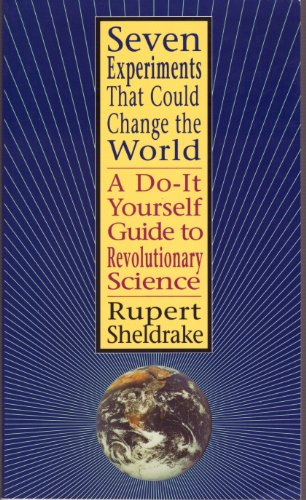Seven Experiments That Could Change the World: A Do-It-Yourself Guide to Revolutionary Science - Softcover

Synopsis
Can science explain the unexplainable? i.e. How does your pet know when you are coming home, how do pigeons home, can people really feel a "phantom" amputated arm? Just an open invitation to explore the unknown, create new science, and perhaps, change the world.
"synopsis" may belong to another edition of this title.
Review
I consider myself an open-minded person, but I tend to become itchy and skeptical when I encounter most books about the "unexplained"--there are just too many secret Soviet laboratories, mysterious disappearances (of the phenomena, and the investigators and data for that matter). And, I must admit, I've was somewhat skeptical of Sheldrake's previous books on "morphic resonance".
But being an open-minded person, I am glad when I can change my mind, and I am glad to report that this is a worthy book--because of its practicality. Sheldrake confronts some of the outstanding questions facing "PSIence"--and proposes level-headed experiments that readers themselves can become engaged in. Science has often made its greatest advances not when areas of the unknown were summarily dismissed--but when a proper balance between paradigm shifts and experimentation fell into place. It is conceivable that books such as this may help with the evolution of PSI to science.
From the Back Cover
NEW SCIENCE
“In any generation, there are only a handful of people whose ideas contain the possibility of significantly altering the course of human history. Dr. Rupert Sheldrake is such a person. His ideas offer a real chance for humanity to regain its spiritual bearings. We have been blessed with a rare genius.”
--Larry Dossey, M.D., bestselling author of Healing Words
How does your pet know when you are coming home? How do pigeons home? Can people really feel another pair of eyes looking at them? These questions and other unexplained natural phenomena form the basis of Sheldrake’s look at the world of established science as he puts some of its most cherished assumptions to the test. He shows how fundamental scientific theories have hardened into unquestioned dogmas and are now taken for granted as scientific common sense. In the true spirit of scientific skepticism, Sheldrake examines seven of these beliefs.
His approach is radical in two senses: not only does he question the content of current scientific doctrines, but he also questions the way that science is done. He suggests that scientific inquiry need no longer be the monopoly of a professional scientific priesthood but can be open to widespread participation by students and by nonprofessionals. Sheldrake presents experiments that allow anyone to participate in this journey of discovery and, in this new edition, gives an update on the exciting results obtained thus far. His experiments look at how scientific research is often biased by experimenters’ expectations, such as the belief that physical constants cannot change. He also examines the taboo against taking pets seriously and explores the question of human extrasensory perception. Perhaps most important, he shows how simple yet radical research is already shaking the very foundations of science as we know it.
In this compelling and intelligent book, Sheldrake offers no preconceived wisdom or easy answers--just an open invitation to explore the unknown, create new science, and perhaps even change the world.
RUPERT SHELDRAKE, PH.D., is a former research fellow of the Royal Society and former director of studies in biochemistry and cell biology at Clare College, Cambridge University. He is the author of more than 60 technical papers in scientific journals and several books, including The Rebirth of Nature, The Presence of the Past, A New Science of Life, and Dogs That Know When Their Owners Are Coming Home. He lives in London.
"About this title" may belong to another edition of this title.

